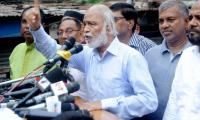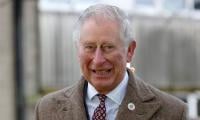Afghan Taliban seized him from Uzbeks’ custody in Zabul; sent him to Pakistan on motorbike once sure he wasn’t an Uzbek
PESHAWAR: Shahbaz Taseer was brought by the Afghan Taliban members on a motorbike through unfrequented routes from Afghanistan before being set free in the Kuchlak town near Quetta on March 8, sources said.
They said the motorcyclists dropped him near the Al-Salim Hotel and Restaurant where he ate a late lunch and used a borrowed phone to call his family in Lahore. The first person he called was his father-in-law Suleman Ghani, a retired civil servant.
Sources close to his family and Taliban told The News that Shahbaz Taseer, son of slain Punjab Governor Salmaan Taseer, spent about four months in the custody of the Afghan Taliban in Afghanistan’s Zabul province. They said he was seized by the Taliban fighters in November, 2015 after killing, injuring and capturing his Uzbek captors, who belonged to the Islamic Movement of Uzbekistan (IMU).
Shahbaz Taseer's Latest Tweet: Shahbaz Taseer back on twitter after release
However, Shahbaz Taseer wasn’t freed at the time as the Taliban commanders who had taken him into custody weren’t sure about his identity. They believed he was an Uzbek because he was seized along with a group of Uzbek militants. At one stage, Shahbaz Taseer told his Taliban captors that he was a British national with a British grandmother who was kidnapped by the Uzbeks.
The scene of action on November 9, 2015 was Zabul where the Afghan Taliban fighters, loyal to their new head Mulla Akhtar Muhammad Mansour, attacked the bases of the IMU and their ally, Mansoor Dadullah, the dissident Taliban commander who had joined the rival faction led by Mulla Muhammad Rasool. Mansoor Dadullah had been running a blood-feud with Akhtar Muhammad Mansour for several years after accusing him and his aides of killing his elder brother, Dadullah Akhund, the well-known, one-legged Afghan Taliban commander. Their enmity intensified when Mansoor Dadullah opposed Akhtar Muhammad Mansour’s appointment as the successor to the late Taliban supreme leader Mulla Muhammad Omar in July 2015.
The way for Shahbaz Taseer’s eventual release was paved when the Afghan Taliban decided to punish the IMU for pledging allegiance to the Islamic State, or Daesh, in July, 2015 and questioning the circumstances of Mulla Omar’s death. It was his good luck that his captors faced defeat and his captors faced defeat and those who survived the Taliban onslaught were captured. Though Shahbaz Taseer was still a prisoner and now in custody of the Taliban, the situation was better because the Uzbeks had tortured him and made videos that were sent to his family to build pressure on it and the Pakistan government to accept their demands for ransom and release of militants. While holding Shahbaz Taseer first in Danday Darpakhel village near Miranshah in North Waziristan and later in the Shawal valley to escape the military’s Zarb-e-Azb operation undertaken in June 2014, the IMU had initially demanded Rs4 billion as ransom and release of 22 Afghan and Pakistani militants, including Salman Taseer’s killer Mumtaz Qadri. Later, it reduced its ransom demand to Rs3 billion and the release of six militants held by the Pakistan government.
The Uzbeks’ defeat at the hands of Taliban destroyed the IMU in the Afghanistan-Pakistan region as its leader Usman Ghazi was captured and killed along with one of his top commanders, Akram, and scores of fighters. The once feared IMU had claimed responsibility for the 2014 terrorist attack on the Karachi airport that prompted the Pakistan government to launch the military action against the militants in North Waziristan.
Once the Afghan Taliban were convinced that Shahbaz Taseer wasn’t an Uzbek, their commanders including Mulla Matiullah who at the time was the ‘shadow’ governor for Zabul, Pir Agha and Mulla Muhammad Alam, decided to release him. The conditions at the Taliban’s private jail were tough as it was a congested and crowded place where Shahbaz Taseer suffered from scabies and the food was perennially beans, potatoes and colocassia (arbi or kachaloo in Urdu).
The sources said that finally one day Shahbaz Taseer was given some money and sent with a group of Taliban fighters heading towards Pakistan on motorcycles. As they had to drive through deserted and unfrequented routes to avoid roadside security checkpoints manned by Afghan soldiers and cops, the journey took more than a week. It ended in the windy Kuchlak town where Shahbaz Taseer became a free man again. The owner of the hotel where he took lunch hadn’t forgotten the man with the long hair and overgrown beard when he saw him on television screens being mentioned as Shahbaz Taseer. Before long he was telling the media and the world that this is the person who had been a customer at his restaurant and was a free man. This gave a lie to the claims that Shahbaz Taseer had been recovered in a raid by the law-enforcement agencies.
Opposition parties strongly criticised move, accusing BJP government of targeting Muslim community ahead of Eid
“Efforts of KP government, led by CM Ali Amin Gnadapur are yielding positive results,” he said in a statement
Despite progress, Khyber-Pakhtunkhwa and Balochistan remain epicentres of violence
As always, Geo Network has curated an exceptional lineup of programming to make Eid even more memorable
£275,000 vehicle was engulfed in flames, prompting bystanders to attempt to extinguish the fire
Bilawal Bhutto Zardari met with flood-affected women and informed them about details of houses







